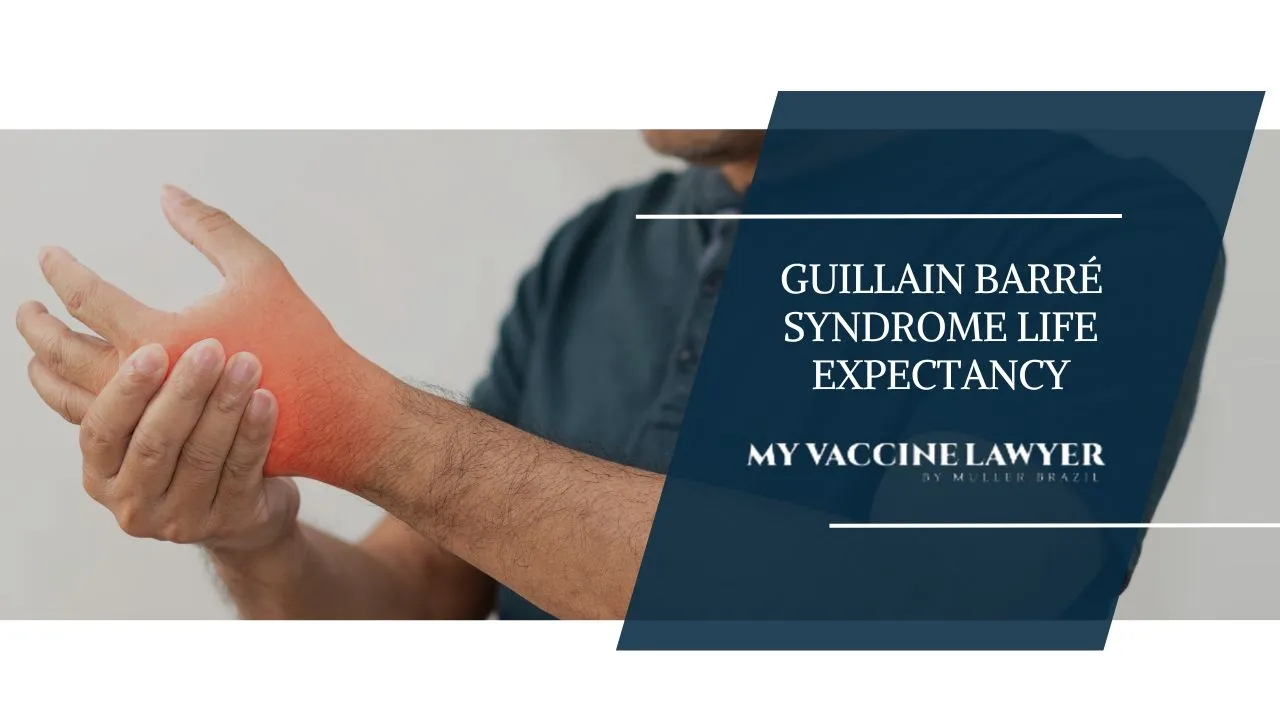Is the Flu Shot Intramuscular?
Yes, the flu shot is administered intramuscularly in most cases, typically in the deltoid muscle of the upper arm.
7 min read
Vaccine Injury Law Resources / Vaccines / What’s CIDP
 Max Muller
:
Jan 23, 2025 11:03:00 AM
Max Muller
:
Jan 23, 2025 11:03:00 AM
Living with Chronic Inflammatory Demyelinating Polyneuropathy (CIDP), a rare autoimmune disorder, can be life-altering.
This condition affects the peripheral nervous system, causing progressive symptoms like muscle weakness, impaired sensory function, and even difficulty walking. For many, the journey begins with subtle signs, but as the condition progresses, it can disrupt everyday life in profound ways.
While CIDP is often linked to natural immune system responses, there’s growing awareness about vaccine-induced cases. These occurrences have left some patients handling not only their health challenges but also the legal challenges of seeking compensation.
Here we will explain CIDP’s causes, symptoms, diagnosis, and treatment while shedding light on its connection to vaccines. Most importantly, we’ll discuss why working with a dedicated vaccine lawyer can make a difference for CIDP patients seeking justice and support.
Chronic Inflammatory Demyelinating Polyneuropathy (CIDP) is a disorder that affects the peripheral nervous system, disrupting the communication between the brain, spinal cord, and nerves. This condition is part of a group of immune-mediated neuropathies, where the immune system attacks the myelin sheath, a protective covering around nerve fibers.
Without the myelin sheath, nerve signals slow down or are lost altogether, leading to progressive weakness, nerve damage, and sensory symptoms like numbness or abnormal sensations. CIDP is often considered the chronic form of Guillain-Barré Syndrome (GBS), another demyelinating neuropathy.
In some cases, CIDP can develop after a chronic infection or even as a reaction to vaccines. This potential connection has raised questions about how certain immune responses may inadvertently harm the nervous system.
Take Control of Your Injury Today
The exact cause of Chronic Inflammatory Demyelinating Polyneuropathy (CIDP) isn’t fully understood. However, experts believe it occurs when the immune system attacks healthy parts of the body by mistake. In the case of CIDP, the immune system targets the myelin sheath, which is the protective layer around nerve fibers. This damage slows or blocks nerve signals, leading to nerve damage and progressive symptoms like muscle weakness or numbness.
Some risk factors and triggers include:
While CIDP can affect anyone, it is more common in adults over 50 and occurs in men more often than women. Identifying potential triggers early is important to managing this disorder.
Chronic Inflammatory Demyelinating Polyneuropathy (CIDP) can cause a range of symptoms that affect the peripheral nerves, which are responsible for sending signals between the brain, spinal cord, and the rest of the body. The most common symptom is progressive muscle weakness that worsens over several weeks or months.
Other symptoms include:
For most CIDP patients, symptoms tend to progress slowly, making it harder to pinpoint the condition early. Without early diagnosis and treatment, the disease can lead to severe complications like nerve damage, paralysis, or significant mobility issues.
Diagnosing Chronic Inflammatory Demyelinating Polyneuropathy (CIDP) can be challenging because its symptoms are similar to other neurological disorders, like Guillain-Barré Syndrome or multiple sclerosis. To determine if someone has CIDP, doctors often follow these steps:
Treating Chronic Inflammatory Demyelinating Polyneuropathy (CIDP) focuses on reducing inflammation, stopping the immune system attacks, and managing symptoms. While there is no cure, early and consistent treatment can improve quality of life for CIDP patients.
Living with Chronic Inflammatory Demyelinating Polyneuropathy (CIDP) can present daily challenges, but early diagnosis and proper care can make life more manageable. Since CIDP is a chronic condition, most patients require ongoing treatment to control symptoms and prevent further nerve damage.
The emotional impact of CIDP can be significant, especially for those dealing with progressive symptoms or sudden lifestyle changes. Support groups, counseling, and open communication with loved ones can make a big difference.
While treatment options like intravenous immunoglobulin (IVIG) and plasma exchange can reduce symptoms, many patients experience flare-ups. Regular check-ins with a neurologist and adapting to changes over time are important for effective management.
Without proper treatment, Chronic Inflammatory Demyelinating Polyneuropathy (CIDP) can lead to serious complications. These complications often result from prolonged nerve damage or untreated symptoms, impacting mobility and overall health.
CIDP is part of a group of immune-mediated neuropathies and shares characteristics with other neuromuscular disorders, such as:
Understanding these related conditions can help patients and doctors identify similar symptoms and tailor treatment plans. Addressing CIDP early reduces the risk of severe complications and improves long-term outcomes.
While Chronic Inflammatory Demyelinating Polyneuropathy (CIDP) typically involves symmetrical weakness and sensory loss, there are several variants of the condition that present differently. Understanding these variants can help with diagnosing CIDP and tailoring treatment.
Typical CIDP
Pure Motor CIDP
Pure Sensory CIDP
Lewis-Sumner Syndrome
Multifocal Motor Neuropathy (MMN)
Each variant requires specific testing, such as nerve conduction studies and blood tests, to confirm the diagnosis. Despite these differences, early CIDP treatment, like plasma exchange or intravenous immunoglobulin (IVIG), can help manage symptoms across all forms.
In some cases, Chronic Inflammatory Demyelinating Polyneuropathy (CIDP) has been linked to certain vaccines. While vaccines are necessary for preventing serious illnesses, they can sometimes trigger unintended immune responses. For certain individuals, this response may lead to the immune system mistakenly attacking the myelin sheath, causing nerve damage and symptoms of CIDP.
The Vaccine Injury Compensation Program (VICP) provides financial support for individuals who develop vaccine-related injuries, including CIDP. The VICP does not hold vaccine manufacturers or providers legally liable but compensates victims for medical costs, lost wages, and pain and suffering.
If you suspect a vaccine caused your CIDP, it’s important to act quickly. Medical records and timely filing with the VICP are critical for a successful claim.
Managing a vaccine injury claim can become overwhelming, especially when you’re dealing with the challenges of Chronic Inflammatory Demyelinating Polyneuropathy (CIDP). Filing a claim through the VICP is not the same as a traditional lawsuit, and the process requires specific documentation, medical evidence, and legal expertise.
A vaccine lawyer can:
At My Vaccine Lawyer, we understand the challenges of CIDP and the emotional toll it can take. Our team has helped countless clients successfully deal with vaccine injury claims, making sure that they get the justice and support they deserve.
Living with Chronic Inflammatory Demyelinating Polyneuropathy (CIDP) can be a life-changing challenge, especially when it’s linked to a vaccine injury. Early diagnosis and treatment are important, but dealing with the legal process to seek compensation shouldn’t add to your burden.
At My Vaccine Lawyer, we specialize in representing clients with vaccine-related injuries like CIDP. Our team has the expertise to handle your claim through the Vaccine Injury Compensation Program (VICP), so you can focus on your health and recovery. With no cost to you, we’ll fight for the compensation you deserve - whether it’s for medical bills, lost wages, or the pain and suffering you’ve endured.
Contact us today to start your case by calling (800) 229-7704 or emailing info@myvaccinelawyer.com. Let us handle the legal process so you can prioritize your well-being. You don’t have to face this experience alone, we are here to support you every step of the way.
Mr. Muller currently devotes the majority of his law practice to aggressively fighting for the victims of unsafe drug and medical device injuries, as well as vaccine injuries and vaccine reactions involving the flu shot, TDaP/DTaP vaccine, and more. He has handled hundreds of SIRVA injury cases (shoulder injury related to vaccine administration), especially those involving bursitis, tendonitis, frozen shoulder, and rotator cuff tears. Mr. Muller also handles cases where vaccines caused serious nerve injuries such as Guillain-Barre Syndrome. Mr. Muller has recovered millions of dollars in compensation for his clients in the Vaccine Injury Compensation Program.

Yes, the flu shot is administered intramuscularly in most cases, typically in the deltoid muscle of the upper arm.

Vaccines play an important role in protecting older adults, especially those who are homebound and face specific challenges in accessing healthcare...

In this blog post, we’ll explore what GBS is, its impact on Guillain Barré Syndrome life expectancy, treatment options, and tips for living with this...
